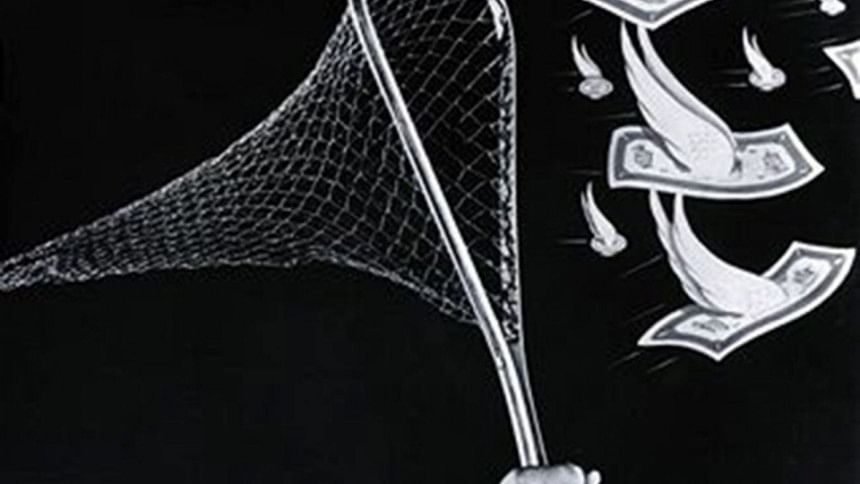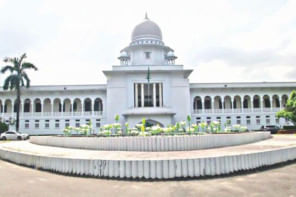Laughing all the way to Swiss banks

Compared to the year before, over 36 percent money went from Bangladesh to Swiss banks last year, but that's not half as shocking as the reasons given by our experts to explain that surge. To say so much money has been leaving the country due to political unrest and lack of investment opportunities simply couldn't be further from the truth. It's like lamenting that thieves slipped through the back door because the front door wasn't left wide open.
Proof of that argument is that the UK, Germany and Italy also saw their exposure to Swiss banks go up during the same year. Indians have historically kept their ill-gotten money in these banks. The United States has a problem with citizens who have been using secret accounts to hide millions from their government.
All of these countries have stable political systems and they offer plenty of investment opportunities when compared to Bangladesh. Yet, their citizens too invoked the Swiss option for the same compulsive reason crows have the habit of hiding food. Those who steal from their countries never feel safe at home.
For Bangladesh, the Swiss banks are the latest destination for tainted money looking for safe havens. There are high-net-worth accounts in many banks of Singapore, Malaysia, the UAE and other countries where unscrupulous Bangladeshis have been parking their loots for years. A growing number of them are also shifting residence to those countries to stay close to their contemptible cash.
Sources of this dirty money have to be bribery, smuggling, stock market manipulation, drug trade, LC tampering, or bank loans not meant to be repaid. Some of it may be legitimate foreign exchange earning that never came home. The questionable cash is stashed in foreign countries either to avoid crackdowns or scrutiny or taxation or all three at once. It can be said without hesitation that all of this money is ill gotten and stolen.
The Swiss bank accounts are a more recent destination for money moving out of Bangladesh. It only shows that the flight has attained critical mass and made it to the big league of thieves and crooks. If significantly more sums ended up in those accounts last year, it means either significantly more illegal money was made last year or a significantly large number of nervous owners scurried to get their money out of the country. Political uncertainty may have played a role, because the owners of ill gotten wealth are always worried that their hardly hard-earned fortune could be taken away from them after a regime change.
By no means has the fortune left because it couldn't be invested in the country. For years, the government has been offering amnesty to black money without getting much result. That experience tells us that dubious wealth is averse to disclosure. The idea of using rotten money to fertilise the economy was flawed, since those who ripped off the country had already proven that they lacked commitment.
The fact is that Swiss banks are a mere symptom, not the disease. It will be futile to fight an outbreak without controlling its source. India has brought down Swiss bank deposits of its citizens by more than 10 percent because its government was able to send a strong message to the corrupt and the wicked. It shows that where there is a will there is a way, neither of which is true for us because we have lost both.
What we have also lost is our sense of right and wrong. The experts wanted to make an economic sense of a criminal offense. And they didn't realise that crime may be rooted in economics but economics doesn't have to be rooted in crime. Lately, we have seen some of them failing to make that distinction in their own confused minds.
Even if full assurance is given, it's highly unlikely that those who have taken their money to Swiss banks will willfully bring it back. In medical terms, autologous blood transfusion is the collection of blood from a patient and re-transfusion back to the same patient when required. The same thing could be done with the misappropriated money, provided Bangladeshi depositors were convinced or coerced to plough back their deposits to the country.
Last year, Switzerland agreed to share information on Indians having illicit money in Swiss banks. The Bangladesh government can also ask for a similar arrangement if it really wants to go after the plunder. There are several ways to deal with criminal depositors, such as threatening to divulge their names, forfeiting their businesses and bank accounts in the country, and throwing them in prison.
Then again everything stumbles if you ask who is going to bell whom, because the mice are nothing but fat cats in disguise.
The writer is the editor of the weekly First News and an opinion writer for The Daily Star.
Email: [email protected]

 For all latest news, follow The Daily Star's Google News channel.
For all latest news, follow The Daily Star's Google News channel. 



Comments